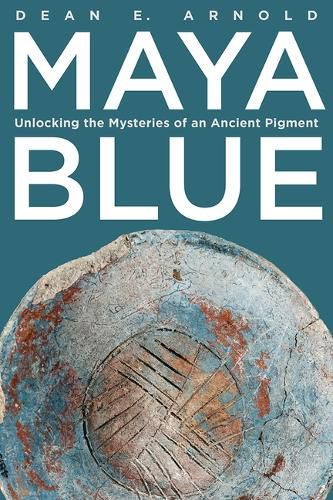Readings Newsletter
Become a Readings Member to make your shopping experience even easier.
Sign in or sign up for free!
You’re not far away from qualifying for FREE standard shipping within Australia
You’ve qualified for FREE standard shipping within Australia
The cart is loading…






One of the great technological achievements of the ancient Maya, Maya Blue is one the world's most unusual ancient pigments. In Maya Blue, Dean E. Arnold offers a comprehensive history of its study for almost a century, filled with personal anecdotes drawn from his decades of work uncovering the Maya knowledge of its constituents, its ancient sources, and how it was made-including previously unknown methods. The book presents a fresh holistic perspective that documents these discoveries and the scientific process that led to them and provides testable hypotheses about how the pigment and the technology used to make it moved throughout Mesoamerica.
Combining the organic dye indigo and the inorganic clay mineral palygorskite in a highly stable chemical hybrid that, unlike indigo, resists attacks by acids, alkalines, and organic solvents and endures without fading, Maya Blue has a rich blue color that has survived for centuries in one of the world's harshest climates. First used at the site of Calakmul in the tropical forest of southern Mexico during the Late Preclassic period, the Maya's abiding hue diffused across Mesoamerica over a period of 1,700 years. It appears on Maya pottery, sculpture, murals, and codices and carries multiple meanings, standing as a symbol for cultural cornerstones from sacrifice to the rain god Chaak. It was discovered in 1931 at Chichen Itza, and its composition was a mystery for more than three decades, but questions about its source, how and why it achieved such stability, and how and why the Maya made the pigment remained for years.
In Maya Blue, Arnold summarizes ethnographic, archaeological, chemical, and material science research over the last century from an anthropological perspective. This thorough, engaging, and accessible book chronicles the history of this pigment as no work has done before.
$9.00 standard shipping within Australia
FREE standard shipping within Australia for orders over $100.00
Express & International shipping calculated at checkout
One of the great technological achievements of the ancient Maya, Maya Blue is one the world's most unusual ancient pigments. In Maya Blue, Dean E. Arnold offers a comprehensive history of its study for almost a century, filled with personal anecdotes drawn from his decades of work uncovering the Maya knowledge of its constituents, its ancient sources, and how it was made-including previously unknown methods. The book presents a fresh holistic perspective that documents these discoveries and the scientific process that led to them and provides testable hypotheses about how the pigment and the technology used to make it moved throughout Mesoamerica.
Combining the organic dye indigo and the inorganic clay mineral palygorskite in a highly stable chemical hybrid that, unlike indigo, resists attacks by acids, alkalines, and organic solvents and endures without fading, Maya Blue has a rich blue color that has survived for centuries in one of the world's harshest climates. First used at the site of Calakmul in the tropical forest of southern Mexico during the Late Preclassic period, the Maya's abiding hue diffused across Mesoamerica over a period of 1,700 years. It appears on Maya pottery, sculpture, murals, and codices and carries multiple meanings, standing as a symbol for cultural cornerstones from sacrifice to the rain god Chaak. It was discovered in 1931 at Chichen Itza, and its composition was a mystery for more than three decades, but questions about its source, how and why it achieved such stability, and how and why the Maya made the pigment remained for years.
In Maya Blue, Arnold summarizes ethnographic, archaeological, chemical, and material science research over the last century from an anthropological perspective. This thorough, engaging, and accessible book chronicles the history of this pigment as no work has done before.